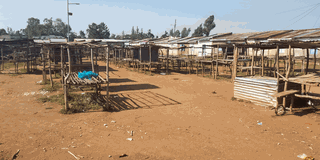Nyang'oma Kogelo slowly sinking into oblivion

Nyang'oma Kogelo open air Market that is in a sorry state.
The once vibrant Nyang’oma Kogelo in Siaya County, overflowing with both local and foreign tourists, claiming a spot on the global map, is slowly turning into a ghost town with few activities.
The town gained global prominence after Barack Obama, who traced his roots to the little-known village, was elected the first African-American president in the United States.
The glory of Nyang’oma Kogelo, however, is sinking slowly into oblivion, with little left to celebrate.
In the glorious days, the town use to get international visitors, prompting the growth of facilities like hotels, health centres and schools.
When Mr Obama was elected president for the first time in 2008, the town underwent a complete overhaul, with the main road connecting Ng’iya in Alego Usonga and Ndori town in Rarieda via Kogelo upgraded to bitumen standard.
Mzee William Okech, 73, remembers the glory that the victory of Mr Obama brought to them.
Goodies followed
“When he was elected president of the US, we received electricity in a period of two days. Thereafter goodies followed us because the entire world wanted to know the village that produced the first US black president,” said Mr Okech.
But that glory, he said, was short-lived as the exit of Mr Obama from the White House led to a reduction in the attention the town received.
“When he left power in 2016, the international media that used to frequent our small town also went away. The only thing that remains is the tarmac road and the electricity that came while our son was in power,” he noted.
Mr Erick Awandu, a boda boda operator at Kogelo, said that in the glorious days there were frequent medical camps that benefited the community, especially those who could not afford frequent medical checkups.
“Our health centre was busy because frequent free medical services were offered by foreign doctors who visited. The eye specialists, the dentists and even the gynecologists were here to attend to the people. Currently, our facility lacks the most basic drugs,” he said.
He added: “As we speak, our police officers at the Kogelo police post are also suffering because they lack proper facilities to offer services to the people. The rate of insecurity has also gone up in this region.”
Locals talk about the past days with nostalgia. Facilities like Senator Barack Obama Secondary School and the Kogelo Cultural Centre are the remaining souvenirs.
According to Mr Jeremiah Omolo, the death of Mama Sara Obama also dealt a big blow to many widows who used to receive support from her initiatives that supported widows and orphans.
“Mama Sarah understood the plight of many women and as such she used the opportunities she got to support the widows and the orphaned children in the area where the majority are living below the poverty line,” he said.
End of her initiatives
“Her demise marked the end of her initiatives. The offices where the services were offered were shut after the death of the matriarch.”
Other than widows and orphaned children, Mr Omolo said, “Mama Sarah also ensured that girls remained in school by offering food and sanitary towels to those who could not afford them.”
The main source of income for the majority of young people in the town is the boda boda and small-scale businesses at the Kogelo open-air market, which has not been built despite promises from local leaders.

A section of Nyangóma Kogelo town.
“I used to work in one of the hotels in Kogelo when there were many local and international tourists. On weekends, vehicles would be packed along the road and the hotels received many clients,” said Anne Atieno, who now sells vegetables at Kogelo market.
“Today the same hotels go for days without clients. Some have closed down while others have reduced the number of employees.”
She also noted that weekends were the best days because people came from as far away as Kisumu and Siaya town to party in Kogelo.
“There used to be a series of events. Local artists who were recognised nationally would perform and the joints would be full. In those days, Kogelo was the place to spend weekends. Those days have gone and the town has very little going on,” Ms Atieno added.
The Covid-19 pandemic also played a major role in killing the hotel industry in the small town; the locals could not afford their services, leaving them to visitors.
As one travels towards the late Mama Sarah’s home, the tarmac road is sandwiched between overgrown shrubs.
“When Mama Sarah was still alive these shrubs would be cleared frequently because there were so many people visiting the home. Today, you can see very few people on this highway,” Ms Atieno said.
The home is neatly maintained but few activities go on there.
Local leaders, led by Siaya Governor Cornel Rasanga, promised to upgrade the home to a museum in order to keep domestic and international tourists coming.
With only one month to the end of his tenure, something is yet to be done.





